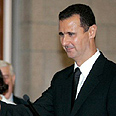Syrian President Bashar Assad
on Saturday approved his country's 2009 budget, which foresees another difficult year ahead.
The budget was calculated based on the price of $51 for a barrel of Syrian oil of good quality, and $42 for a barrel of oil of poorer quality. Thus, according to the current oil prices, the Syrians fear that the deficit will exceed expectations.
The budget expenditures totaled 638 billion Syrian pounds (about $13.7 billion). The budget deficit for 2009 was set at 266 billion SYP ($5.3 billion) – about 9.25% of the Syrian product expected in 2009.
Peace Negotiations
Roee Nahmias
Arab sources tell Qatari daily al-Watan that Damascus intends to resume negotiations with Jerusalem only after Obama inauguration, completion of Israeli elections
The year 2008 did not benefit the Syrian market. Although Syria exports oil, its oil reserves are shrinking. In addition, the country is forced to rely on the import of refined oil products.
The prices of oil and other goods, which were high in global markets, have led to a sharp rise in the inflation rate and to an additional burden on the Syrian treasury, which provides a series of subsidies on basic products and refined oil products.
In May of 2008, the Syrian government was forced to announce that it would cut down on the subsidies, a decision which has worsened the ordinary citizen's situation even more.
'Inessential expenses' cut back
The belt-tightening policy continues in the 2009 budget. The budget, which will be implemented as of January 1, cuts down on the transportation and office costs of the various governmental bodies, and forbids any "inessential expenses" like upgrading vehicles and furniture.
About 40% of the budget - $5.5 billion – will be allotted to investment projects across Syria. The rest (some $8.2 billion) will be directed to the coverage of current expenses, led by security-related ones.
In order to try and provide the budget proposal with a positive aspect, Syria's treasury heads explained that the budget is aimed at creating some 60,000 working places. They pointed to a rise of nearly 20% in the investment budget and a rise of nearly 11% in the current expenses clause.
But not everyone in Syria believes the government's declarations. In one of the discussions on the budget proposal at the Syrian People's Council (the parliament), several parliament members slammed the treasury officials, claiming the government should present a real plan to combat corruption, which has destroyed every good thing in the governmental sector.
The MPs also said that the government must implement a practical plan to prevent the waste of resources in the ministries, as well as launch a serious reform in the public sector rather than just "talk".
Dr. Gil Feiler is founder and managing director of Info-Prod Research (Middle East) Ltd. , and Doron Peskin is head of research

Assad cutting back on expenses
Photo: AFP
מומלצים















